Sam Webster's Blog, page 3
May 21, 2014
Building the Priesthood of Hermes
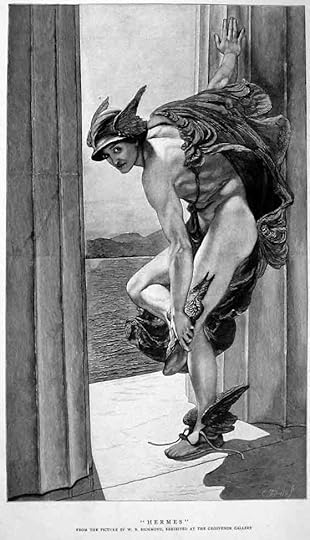 Part of the on-going project of rebuilding the Cults of the Many Gods is to re-establish their priesthoods. Since all those lineages were destroyed so many years ago,the only choice before us is to rebuild. Those of us who have priestly relations with specific Gods and Goddesses have the ability to re-found those lineages in a manner appropriate to our era. While I work for a number of Deities, Hermes is my primary Patron, and so I am starting with Him.
Part of the on-going project of rebuilding the Cults of the Many Gods is to re-establish their priesthoods. Since all those lineages were destroyed so many years ago,the only choice before us is to rebuild. Those of us who have priestly relations with specific Gods and Goddesses have the ability to re-found those lineages in a manner appropriate to our era. While I work for a number of Deities, Hermes is my primary Patron, and so I am starting with Him.
This work is hosted over on the Digital Herm site, and today I’ve posted more about the workings of establishing His priesthood. Let me know what you think…
May 14, 2014
Nine Refuges
I take Refuge in the Guru, the Deva, and the Dakini-Daka
I take Refuge in Shunyata, Tathagatagharba, and Magic itself
This refuge formula is suitable for contemporary magic-users, and appropriate for today, the full moon in May, considered by some to be the Buddha’s birthday.
The first line is the most standard form. My favorite explanation of it is from old Uncle Al:
I take my refuge in the Buddha. That there was once a man who found the Way is my encouragement.
I take my refuge in the Dhamma [Pali form of Dharma]. The Law underlying phenomena and its unchanging certainty; the Law given by the Buddha to show us the Way, the inevitable tendency to Persistence in Motion or Rest — and Persistence, even in Motion, negates change in consciousness — these observed orders of fact are our bases.
I take my refuge in the Sangha. These are not isolated efforts on my part; although in one sense isolation is eternally perfect and can never be overcome, in another sense associates are possible and desirable.
From the Collected Works of Aleister Crowley
The second line is from the Vajrayana vehicle, the tantric and magical form of Buddhism. There, the personified example is the Teacher, who the student is to view as a Buddha. The Law is embodied in the (generally) anthropomorphic form as the Deva or Deity, who the student is to invoke and become. The Dakini-Daka is female and/or male consort in tantric, sometimes sexual, practice, and it is in them we take refuge in much the same way as in the Sangha, or community of students/practitioners.
The third line I made up. It parallels the Buddha (the One who attained), and the Guru (the immediate Teacher), with Shunyata, the characteristicless Ground of Being, the ultimate refuge. It parallels the Dharma or Law, and the Deva or invocation Deity, with the Buddha-nature, Tathagatagharba, and the underlying, fundamental principal and ultimate vehicle of our enlightenment: that we are already there. Finally, the Community, or Sangha, and the Consort, the Dakini-Daka, are paralleled to Magic, or Dependent Co-arisal, the Buddhist principal of magic and the basis for the power of ritual, mantra, and all such technologies. Here the words are simplified to just ‘magic’.
In these three lines are respectively united the historical framework of refuge, the educational process of tantric attainment, and the cosmological ground and means of attainment.
Hail to Those Who have Thus Gone!
[I’ve written more about Refuge and why it is valuable to magic-users and Pagans in general in my book Tantric Thelema.]
May 7, 2014
The Place of the Mage in Cosmos
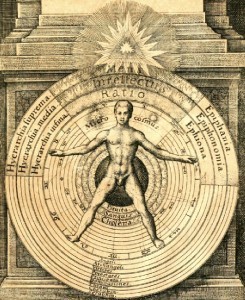 Given that the main tap-root of the Golden Dawn is in Neoplatonic theurgy, we can start there to ask questions about the place and nature of the individual soul, and especially that of the mage, in the architecture of the Cosmos. A recent contemplation lead me to an interesting proposition…
Given that the main tap-root of the Golden Dawn is in Neoplatonic theurgy, we can start there to ask questions about the place and nature of the individual soul, and especially that of the mage, in the architecture of the Cosmos. A recent contemplation lead me to an interesting proposition…
April 23, 2014
Belief is a Mental Illness
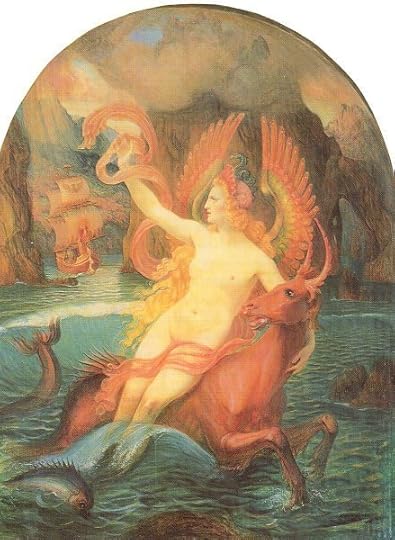 Christianity is a strange religion. It is the only one which makes ‘belief’ a central component. Originally instituted by Paul of Tarsus, called ‘saint’, it was a way to get around circumcision. By believing in Christ Jesus, one becomes ‘circumcised of heart’. It has been argued that the purpose of this kind of talk was to stop scaring off the Roman men from early Christianity, which looked a lot like Judaism which required surgery for men to join. Clever.
Christianity is a strange religion. It is the only one which makes ‘belief’ a central component. Originally instituted by Paul of Tarsus, called ‘saint’, it was a way to get around circumcision. By believing in Christ Jesus, one becomes ‘circumcised of heart’. It has been argued that the purpose of this kind of talk was to stop scaring off the Roman men from early Christianity, which looked a lot like Judaism which required surgery for men to join. Clever.
But there is a problem with belief. Although accepted in our culture at this time, that can only be due to its Biblical imprimatur and the habit of time. Belief, as an epistemological statement, is the assertion of the truth-value of a proposition, e.g., Jesus Christ is Lord, when there is no evidence or rational foundation for the proposition. If there was evidence, or if reason could ascertain the veracity of the proposition, it would be a fact, or a logical conclusion.
We, in the west, somehow think that religion should be exempt of this simple reality, that it should not be subject to fact, or reason, or even experiment.
However, this is the nature of psychosis, which is a mental state described as ‘involving a loss of contact with reality’. Without the ability to resort to fact, logic, or testability, the acceptance of a proposition as true requires a separation from reality or a framing of reality in variance from the facts.
As if that is not bad enough, because at some level we all just have to guess, what makes belief so problematical is that folks get attached to the proposition, make make it into ‘faith’. This can lead to very bad decisions.
Here are a couple of links that show the failure of fact to convince in the face of belief.
Why the New Data Journalism Really Is Partisan
When Evidence Backfires
Our society came to value the empirical during the enlightenment as a way of out the bloody Wars of Religion. At least then we could agree on the facts. Now, not so much. Insanity.
April 16, 2014
Moving to The Wild Hunt!
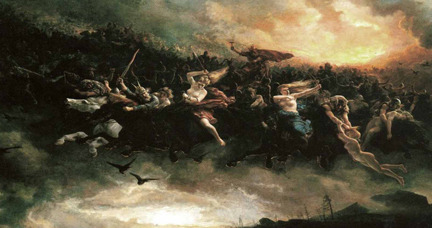 For the last almost two years I have been writing monthly posts on the Witches & Pagans Pagan Square blogsite under the title of Arkadian Anvil, and also on Patheos, under Pagan Restoration. In May I am moving to The Wild Hunt, and posting on 4th Saturdays, starting May 24. Please come join me there as the Arkadian Observer, where I hope to provide historical and theological commentary on contemporary Pagan issues.
For the last almost two years I have been writing monthly posts on the Witches & Pagans Pagan Square blogsite under the title of Arkadian Anvil, and also on Patheos, under Pagan Restoration. In May I am moving to The Wild Hunt, and posting on 4th Saturdays, starting May 24. Please come join me there as the Arkadian Observer, where I hope to provide historical and theological commentary on contemporary Pagan issues.
Moving to The WIld Hunt!
 For the last almost two years I have been writing monthly posts on the Witches & Pagans Pagan Square blogsite under the title of Arkadian Anvil, and also on Patheos, under Pagan Restoration. In May I am moving to The Wild Hunt, and posting on 4th Saturdays, starting May 24. Please come join me there as the Arkadian Observer, where I hope to provide historical and theological commentary on contemporary Pagan issues.
For the last almost two years I have been writing monthly posts on the Witches & Pagans Pagan Square blogsite under the title of Arkadian Anvil, and also on Patheos, under Pagan Restoration. In May I am moving to The Wild Hunt, and posting on 4th Saturdays, starting May 24. Please come join me there as the Arkadian Observer, where I hope to provide historical and theological commentary on contemporary Pagan issues.
April 2, 2014
Origins Matter
 Where does the Golden Dawn come from? We know about the Cypher Manuscripts, and we know the Founders developed them, in several stages, into the rituals we know today. We also know there has to be more of a backstory.
Where does the Golden Dawn come from? We know about the Cypher Manuscripts, and we know the Founders developed them, in several stages, into the rituals we know today. We also know there has to be more of a backstory.
On the OSOGD site, I summarize my research in a brief post:
March 12, 2014
Institutions in Paganism: the Coin is for All
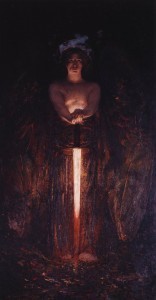 Counter culture, or up and coming? Are we a religion of individuals or do we have collective will? For thousands of years now humans have collaborated and accomplished great things across the generations by building institutions. Will the Pagan community build institutions to project our Way though time, or are we just the florescence of our time, to be superseded as the individuals coalesce into a new and different form? Efforts are being made. Come see on Pagan Restoration…
Counter culture, or up and coming? Are we a religion of individuals or do we have collective will? For thousands of years now humans have collaborated and accomplished great things across the generations by building institutions. Will the Pagan community build institutions to project our Way though time, or are we just the florescence of our time, to be superseded as the individuals coalesce into a new and different form? Efforts are being made. Come see on Pagan Restoration…
March 5, 2014
Supernatural, not really…
 The ‘supernatural’ is often considered the sine qua non of religion. Certainly the Gods and Spirits must be considered supernatural, yes? Well…not necessarily.
The ‘supernatural’ is often considered the sine qua non of religion. Certainly the Gods and Spirits must be considered supernatural, yes? Well…not necessarily.I can’t say that I’m a fan of the concept. Here are some thoughts on the Arkadian Anvil.
February 26, 2014
Iamblichus on Prayer
Extended practice of prayer
nurtures our intellect,
enlarges very greatly our soul’s receptivity to the Gods,
reveals to men the life of the Gods,
accustoms their eyes to the brightness of divine light, and
gradually brings to perfection the capacity of our faculties
for contact with the Gods,
until it leads us up to the highest level of consciousness (of
which we are capable);
also, it elevates gently the dispositions of our minds, and
communicates to us those of the Gods,
stimulates persuasion and communion and indissoluble friendship,
augments divine love,
kindles the divine element in the soul,
scours away all contrary tendencies within it,
casts out from the aetherial and luminous vehicle surrounding the soul
everything that tends to generation,
brings to perfection good hope and faith concerning the light;
and, in a word, it renders those who employ prayers,
if we may so express it, the familiar consorts of the Gods.
Iamblichus, De Mysteriis 2003 5.26, p. 277, emphasis and formatting added, gendering per original



